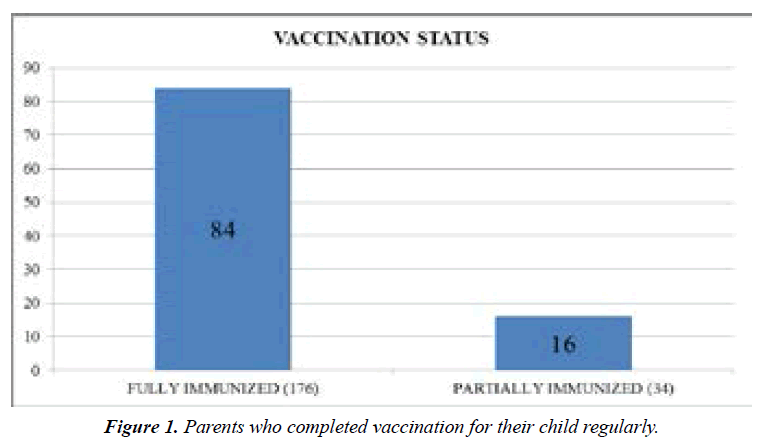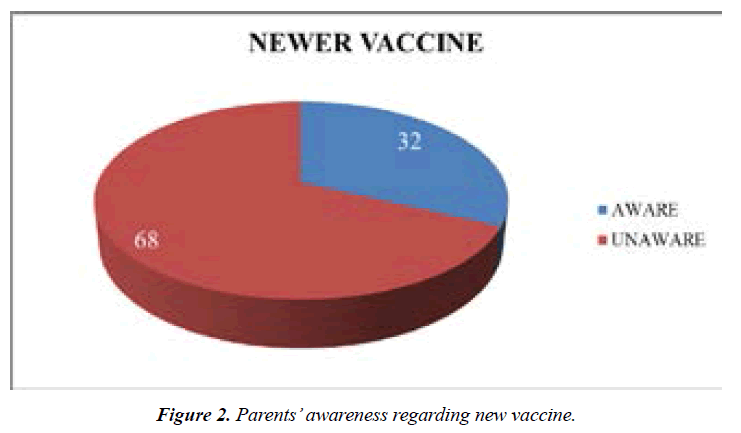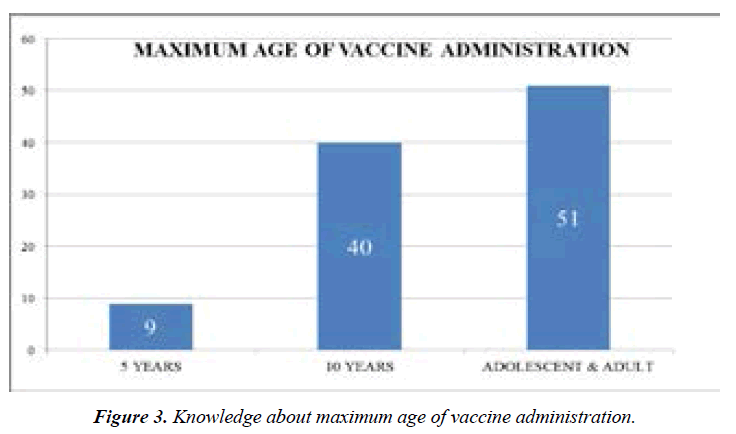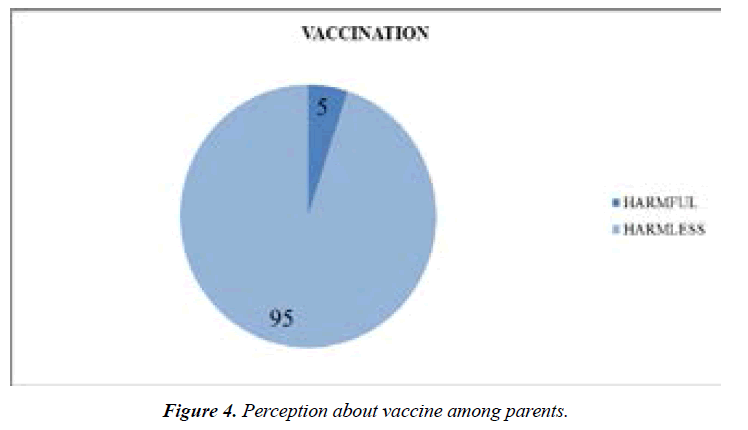Research Article - Journal of Clinical Immunology Research (2022) Volume 5, Issue 4
Study on knowledge, attitude and practice regarding immunization, among parents having children less than 16 years of age: A cross sectional study.
Sivagurunathan P1, Thangavel A1, Vairamuthu GS1, Krishna Prasanth B2*1Department of Pediatrics, KAPV Government Medical College, Tiruchirapalli, India
2Department of Community Medicine, Sree Balaji Medical College & Hospital, Bharath Institute of Higher Education & Research, Chennai, India
- *Corresponding Author:
- Krishna Prasanth B
Department of Community Medicine
Sree Balaji Medical College & Hospital
Bharath Institute of Higher Education & Research, Chennai, India
E-mail: mail2kristain@gmail.com
Received: 13-Aug-2022, Manuscript No. AACIR-22-72975; Editor assigned: 15-Aug-2022, PreQC No. AACIR-22-72975(PQ); Reviewed: 27-Aug-2022, QC No. AACIR-22-72975; Published: 31-Aug-2022, DOI: 10.35841/aacir-5.4.120
Citation: Sivagurunathan P, Thangavel A, Vairamuthu GS, et al. Study on knowledge, attitude and practice regarding immunization, among parents having children less than 16 years of age: A cross sectional study. J Clin Immunol. 2022;5(4):120
Abstract
Background: Immunization is one of the health interventions, that is most economical in preventing various diseases. The study's primary goal is to evaluate the knowledge, attitudes, and vaccination practices amongst parents of children under the age of 16. This study also evaluates the awareness of parents towards newer vaccines present today.
Methods: A Cross-sectional study among 210 parents was done, using random sampling technique. Informed consent and ethical committee approval were obtained. A questionnaire was made to collect the data regarding parent’s knowledge, attitude and practice. Data collected was analyzed in MS-Excel.
Results: Out of 210 parents, who were interviewed, 68.6% of parents had desirable knowledge about immunization, 43.8% of parents had desirable attitude towards immunization and 84.5% had desirable practice towards good immunization. Among 210, 84% fully vaccinated their child for age, 68% of parents were not aware of the newer vaccine. Doctors were the main source of information. 5% perceived that vaccination is harmful to their child.
Conclusion: Parents have little knowledge of more recent vaccines. For the public to embrace the new vaccine and also to keep their faith in the current vaccine, vaccination knowledge among doctors and health education among the general public are crucial. There should be widespread implementation of the National Immunization Schedule awareness campaign.
Keywords
Awareness program, Health education, Parental education.
Introduction
Childs health includes physical health, mental health and social well-being. Global coverage with routine vaccines has risen from 5% on average to >84%, since the World Health Organization (WHO) introduced an extended immunisation programme in 1974. The third dose of the diphtheria, tetanus, and pertussis vaccine (DTP) by the end of the first year of life is a key performance indicator for immunisation programmes [1]. Large population and poor awareness among the public are the main obstacle to India's low immunisation rate. Diseases can be prevented to some extent by the implementation of National Immunization schedule; according to the saying “Prevention is better than cure”. In 2016, nearly 1 in 10 children did not receive any vaccination. WHO s ays an additional 1.5 million deaths could be avoided if global immunization average improves. The number of children who received vaccinations in 2017 reached an all-time high of 116.2 million. More than 20 million additional children have been immunised since 2010 as a result of the introduction of new vaccines in 113 different countries [2]. Polio has been completely eradicated from India, where as measles, rubella, maternal and neonatal tetanus is behind the schedule. Children from the poorest, most marginalised areas make up the majority of those who are missing out. Immunization protects against a number of diseases such as cervical cancer, diphtheria, pertusis, tetanus, hepatitis-B, measles, mumps, rubella, pneumonia, polio and rotavirus which causes illness, disability and death. ‘169 million children missed out 1st dose of measles vaccine between 2010 and 2017’, UNICEF said [3].
Methodology
A hospital-based study was conducted using cross sectional study design in a tertiary care hospital, among parents who are attending pediatric out-patient department and parents who have admitted their child in hospital. The size of the sample was calculated using the formula [n=[(Zα/2)2.P (1-P)]/d2] with 95% CI, where, p=61.5%, q=1-p, d=10% of p, n=205 (rounded to 210). The study proposal was approved by institutional ethical committee. A questionnaire was developed on the basis of Parents knowledge and practice towards the vaccination. A sample space of 210 parents was taken by simple random sampling method. Developed questionnaire had two sections with section 1 describing about the socio-demographic details of the study participants and section 2, focusing on knowledge, attitudes and practice/behaviour among parents about the vaccine in the national immunization schedule and was limited to 16 questions. The voluntary consent was obtained from the parents after informing in detail about the procedure and details regarding the study. All the eligible parents were then interviewed with the questionnaire.
Results
Socio-demographic data
Total of 210 parents participated in the study of vaccination knowledge, attitude and practice. Out of these, majority were mothers (70%). Most of the mothers (71.5%) and fathers (75%) were between 25 to 35 years of age. The birth order of majority of the child came to the hospital with these parents was second order, accounting to about 60.5%. With respect to the educational status of the parents, majority of the fathers were undergraduates (44.6%), followed by postgraduates (43.2%) and majority of the mothers were graduates (48.6%), followed by postgraduates (33.1%) (Table 1).
| Variables | n (%), (n = 210) |
|---|---|
| Relation to the child | |
| Father | 63 (30%) |
| Mother | 147 (70%) |
| Father age | |
| Less than 25 years | 3 (5%) |
| 25-35 years | 47 (75%) |
| More than 35 years | 13 (20%) |
| Mother age | |
| Less than 25 years | 26 (17.5%) |
| 25-35 years | 105 (71.5%) |
| More than 35 years | 16 (11%) |
| Birth order of the child | |
| First order | 82 (39%) |
| Second order | 127 (60.5%) |
| Third order | 1 (0.5%) |
| Education of father | |
| Illiterate | 2 (2.9%) |
| Undergraduates | 28 (44.6%) |
| Graduates | 6 (9.3%) |
| Postgraduates | 27 (43.2%) |
| Education of mother | |
| Illiterate | 8 (5.1%) |
| Undergraduates | 20 (13.2%) |
| Graduates | 71 (48.6%) |
| Postgraduates | 48 (33.1%) |
Table 1. Socio-demographic data.
Knowledge, attitude and practice/behavior regarding immunization
Out of 210 parents who were interviewed, 68.6% of parents had desirable knowledge about immunization, 43.8% of parents had desirable attitude towards immunization and 84.5% had desirable practice towards good immunization (Table 2).
| Variable | Count | Percentage |
|---|---|---|
| Knowledge about immunization | ||
| Desirable | 144 | 68.6% |
| Undesirable | 66 | 31.4% |
| Attitude towards immunization | ||
| Desirable | 92 | 43.8% |
| Undesirable | 118 | 56.2% |
| Practice towards immunization | ||
| Desirable | 177 | 84.5% |
| Undesirable | 33 | 15.5% |
Table 2. Knowledge, attitude and practice/behaviour regarding immunization.
Out of 210, 84% of the parents vaccinated their child fully for their age, whereas, 16% has partially vaccinated (Figure 1). Immunization knowledge of the parents were mostly acquired from the doctors (69%), followed by, relatives (24.2%), mass media (4.8%) and Internet (2%) (Table 3). As a result of decreased awareness among the public regarding vaccination, majority (68%) of the parents weren’t aware of the newer vaccine (Figure 2). Parents knowledge regarding the maximum age for which vaccine can be administered is described in the bar diagram (Figure 3), which shows, 9% of parents answering 5 years, 40% of parents answering 10 years and more than half of the study population answering adolescents and adults. We also found that parents had a false belief that autism can be caused due to vaccine administration. Among the 210 parents, certain proportion (5%) think vaccination is harmful (Figure 4).
| Sources | % | Count |
|---|---|---|
| Doctor | 69% | 145 |
| Relatives | 24.2% | 51 |
| Internet | 4.8% | 10 |
| Mass Media | 2% | 4 |
Table 3. Source of knowledge regarding immunization.
When the parents were asked the regarding the reason for missing the vaccination on time according to the national immunization schedule, majority of the parents (62.5%) said that their child was sick during that time. 18.8% of parents weren’t aware of the immunization schedule. 4 parents said that they were afraid of the side effects associated with vaccination and 2 parents said they did vaccinate the child due to inaccessibility (Table 4).
| Reason | Percentage of parents |
|---|---|
| Sick child | 21 (62.5%) |
| Unawareness | 6 (18.8%) |
| Fear of side effects | 4 (12.5%) |
| Inaccessible | 2 (6.2%) |
Table 4. Reason for missing the vaccination.
Table 5 describes the questions which were asked to the parents regarding their knowledge about vaccines. When asked whether the child can be vaccinated during common cold, 82% of the parents answered “No”. Similarly, majority of the parents answered “No”, when they were asked, if the child can be vaccinated during fever (87%) or diarrhea (76%). The parents were asked, if any of the vaccines are available after 20 years of age, for which, 33% of parents answered “Yes” and 67% answered “No”.
| Knowledge Assessment Questions | Yes (%) | No (%) | Don’t Know (%) |
|---|---|---|---|
| Child with common cold can be vaccinated | 5% | 82% | 13% |
| Child with fever be can vaccinated | 4% | 87% | 9% |
| Child with diarrhea can be vaccinated | 5% | 76% | 19% |
| Vaccination available after 20 years of Age | 33% | 67% | - |
Table 5. Knowledge about immunization.
Discussion
An essential public health management technique to lower the deaths and morbidity linked to contagious diseases is vaccination. More children have been saved by vaccination in the past 50 years than by any other medical practice. Vaccinations are indeed a simple, secure, and one among the most inexpensive approaches to save and enhance the lives of children all over the world [4]. This present study has tried to evaluate the Knowledge, Attitudes and Practice/behavior of parents about Immunization of their children in a tertiary care hospital.
The current study shows 68.6% of parents had desirable knowledge about immunization, 43.8% of parents had desirable attitude towards immunization and 84.5% had desirable practice towards good immunization. Similar results were obtained in previous study done by Mohammed et al. [5]. But another study done by Jose et al. [6] reported that only 10.9% of the parents had good knowledge towards vaccination and only 32.7% had good practice. This difference may be due to the fact that their study was done only among the fathers. Another study done by GebreEyesus et al. [7], reported majority of the parents had good knowledge, favorable attitudes and good practice/behaviour towards immunization.
Immunization knowledge of the parents was mostly acquired from the doctors (69%). Similar finding was observed in previous study done by Joseph et al. [8] and Akunuri et al. [9]. But another study by Angadi et al. [10], reported that the source of information regarding immunization was maximum from relatives and family members, followed by Auxiliary Nurse Midwives (ANMs). This difference may be due to the fact that the previous study was done among slum population and was a community-based study whereas our study was done in a hospital setup.
Majority of the parents in our study were not aware of the fact that there are vaccines in addition to the routine vaccines in the immunization schedule and needed to be taken. Similar finding was observed in a previous study done by Akunuri et al. [9], where 80% of the parents weren’t aware of the additional vaccines apart from routine immunization.
More than half of the study population in our study has answered that the maximum age for vaccine administration to be adolescent/adults. Previous study done by Napolitano et al. [11] describes the knowledge, attitudes and behavior of parents towards recommended adult vaccinations, which reports high knowledge and attitude, but low behavior towards recommended adult vaccinations.
A study by Gidengil et al. [12] describes the most frequently expressed misconceptions regarding vaccines which includes, that vaccines increases the risk of developing illnesses, that a child's immune system can be overburdened if they receive too many vaccinations at once, that vaccines comprises harmful additives, that small children are much more vulnerable to vaccine related side effects, that vaccines are given only for monetary benefit, and that naturally occurring immune function is preferable to immunity gained through vaccination. In support of this study, we observed that, 5% of our study population believed that vaccination is harmful to their child.
The goal of world immunization week, which is observed in the final week of April, is to encourage vaccination use to safeguard people of all ages against numerous diseases.
World Immunization Week 2021 aims to:
• Rephrase the global vaccine discussions to emphasize the advantages of vaccinations.
• To draw attention to the various ways that vaccines help us live a healthy life, fulfilling lives by avoiding the transmission of diseases that can be prevented by receiving a vaccine.
• Provide evidence that the general public already values and trusts immunizations.
• Foster a sense of community and trust in immunisation as a public good that safeguards health and improves patient outcomes. To do this, we will continue to look for more partners to join us as we unite people in aid of a life-saving initiative [13].
The results obtained from this study throws light on where we need to focus, so as to make us more closer towards reaching the goals of world immunization week.
Conclusion
Majority of the parents in our study had desirable knowledge (68.6%), undesirable attitude (56.2%) and desirable practice (84.5%). Year after year, vaccination saves millions and millions of lives and is acknowledged for being one among the most effective and affordable health interventions. It is crucial to develop innovative tactics to emphasize the value of immunization and inform parents about the significance of vaccine for both the individual as well as the community.
References
- Sebastian J, Parthasarathi G, Ravi MD. Development of knowledge, attitude and practice questionnaire of parents towards vaccination: process, challenges and solutions. Ind J Pharm Pract. 2017;10(2):115-120.
- World Immunization Week 2019. WIE 2019: Key messages. WHO. 2019.
- Press release. Over 20 million children worldwide missed out on measles vaccine annually in past 8 years, creating a pathway to current global outbreaks - UNICEF. UNICEF Press release. 2019.
- Mereena, Sujatha R. A Study on Knowledge and Attitude Regarding Vaccines among Mothers of Under Five Children attending Pediatric OPD in a Selected Hospital at Mangalore. IOSRJNHS. 2014;3(5):39-46.
- Mohammed MB, Al-Zahrani A. Knowledge, Attitude and Practice of Mothers toward Children’s Vaccination at Alfatih One in Sudan. Open J Nursing. 2021;11(7):557-565.
- Jose SE, Joseph NC, Sheela S, Joshy VM. Knowledge, attitude and practice of fathers about childhood immunization: a tertiary care hospital based cross sectional study. Int J Comm Med Public Health. 2020;7(5):1932-1935.
- GebreEyesus FA, Tarekegn TT, Amlak BT, Shiferaw BZ, Emeria MS, Geleta OT, Mewahegn AA, Feleke DG, Chanie ES. Knowledge, Attitude, and Practices of Parents About Immunization of Infants and Its Associated Factors in Wadla Woreda, North East Ethiopia, 2019. Pediatr Health Med Therap. 2021;12:223-238.
- Joseph J, Devarashetty V, Reddy SN, Sushma M. Parents’ knowledge, attitude, and practice on childhood immunization. Int J Basic Clin Pharmacol. 2017;4(6):1201-1207.
- Akunuri S, Dayal A. What do parents think? Knowledge and awareness about newer vaccines: a cross-sectional study in South Indian city. Int J Contemp Pediatr. 2016;3(4):1301-1306.
- Angadi MM, Jose AP, Udgiri R, Masali KA, Sorganvi V. A Study of Knowledge, Attitude and Practices on Immunization of Children in Urban Slums of Bijapur City, Karnataka, India. J Clin Diagn Res. 2013;7(12):2803-2806.
- Napolitano F, Della Polla G, Angelillo IF. Knowledge, Attitudes, and Behaviors of Parents towards Recommended Adult Vaccinations: An Explanatory Survey in the Geographic Area of Naples, Italy. Int J Environ Res Public Health. 2019;16(12):2070.
- Gidengil C, Chen C, Parker AM, Nowak S, Matthews L. Beliefs around childhood vaccines in the United States: A systematic review. Vaccine. 2019;37(45):679-6802.
- World Immunization Week 2021. Overview. WHO 2021.
Indexed at, Google Scholar, Cross Ref
Indexed at, Google Scholar, Cross Ref
Indexed at, Google Scholar, Cross Ref
Indexed at, Google Scholar, Cross Ref
Indexed at, Google Scholar, Cross Ref
Indexed at, Google Scholar, Cross Ref
Indexed at, Google Scholar, Cross Ref
Indexed at, Google Scholar, Cross Ref
Indexed at, Google Scholar, Cross Ref



